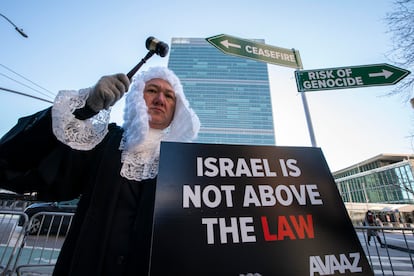Israel, before the international courts
Two legal processes underway are trying to determine whether a genocide is being committed in Gaza

History is prolific in cruel ironies that turn victims into executioners, the oppressed into oppressors and anti-fascists into fascists; these are disturbing metamorphoses that are not usually acknowledged willingly by those who experience them, since what they see is an attack on their good conscience and the destruction of the angelical aura under which they had always acted. Now weighing on Israel, a country founded by the victims of the most characteristic genocide of the 20th century, is the suspicion that it may have committed crimes similar to those that gave it deserved legitimacy in its aspirations for a safe homeland where its people could live in peace. And the suspicion weighs in the highest courts, not in the crude and almost always despicable exchange of political rhetoric.
There are two processes underway before the International Court of Justice, driven by overwhelming majorities in the United Nations General Assembly, that aim to determine whether a genocide is being committed in Gaza, and whether the crime internationally classified as apartheid is underway in the occupied Palestinian territories as a whole. Although they are merely advisory resolutions, their political and, above all, reputational value is beyond discussion.
After the first hearing, held in January, the court imposed precautionary measures to prevent genocide from being committed, but it did not go into the merits of the case. There is no data to corroborate compliance with the orders of the court, to which the Netanyahu government must report at the end of February. The second hearing, now underway, with participation by 51 countries, responds to a request for a non-binding advisory opinion on the legal consequences of the violation of the right of the Palestinian people to self-determination, the occupation and annexation of territory, and the modification of the demographic composition and status of Jerusalem.
Israel attended the first public hearing, motivated and outraged by the accusation of genocide, but it did not deign to appear at the second. The United States did show up, a few hours after its veto of the Security Council resolution demanding an immediate ceasefire in Gaza. This time, also to oppose an immediate end to the occupation if Israel’s security is not guaranteed at the same time. It was not a closed defense of Israel’s position, as the U.S. delegation showed its rejection of the permanent occupation of territories by force and defended a negotiation leading to two States.
Palestine has become the touchstone of the United Nations system and international law. There is no way to justify this increasingly visible and stark double standard without being ashamed. There is an abyss that widens with the war and the repeated boycott of compliance with international resolutions on Palestine by Israel and the United States, two countries considered by many to be exemplary. Only the most tyrannical regimes can rejoice over so much impotence.
Sign up for our weekly newsletter to get more English-language news coverage from EL PAÍS USA Edition
Tu suscripción se está usando en otro dispositivo
¿Quieres añadir otro usuario a tu suscripción?
Si continúas leyendo en este dispositivo, no se podrá leer en el otro.
FlechaTu suscripción se está usando en otro dispositivo y solo puedes acceder a EL PAÍS desde un dispositivo a la vez.
Si quieres compartir tu cuenta, cambia tu suscripción a la modalidad Premium, así podrás añadir otro usuario. Cada uno accederá con su propia cuenta de email, lo que os permitirá personalizar vuestra experiencia en EL PAÍS.
¿Tienes una suscripción de empresa? Accede aquí para contratar más cuentas.
En el caso de no saber quién está usando tu cuenta, te recomendamos cambiar tu contraseña aquí.
Si decides continuar compartiendo tu cuenta, este mensaje se mostrará en tu dispositivo y en el de la otra persona que está usando tu cuenta de forma indefinida, afectando a tu experiencia de lectura. Puedes consultar aquí los términos y condiciones de la suscripción digital.









































